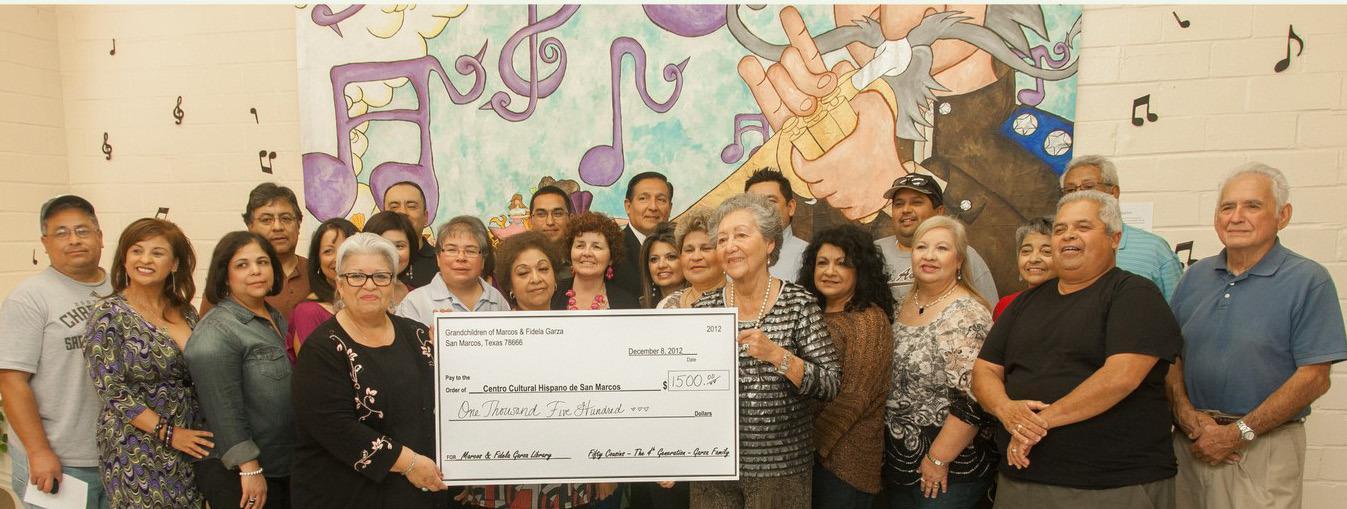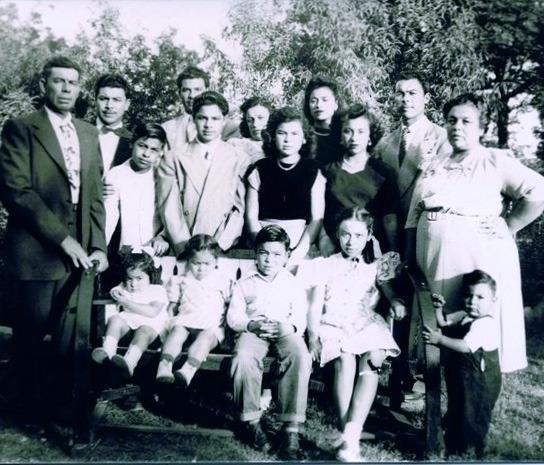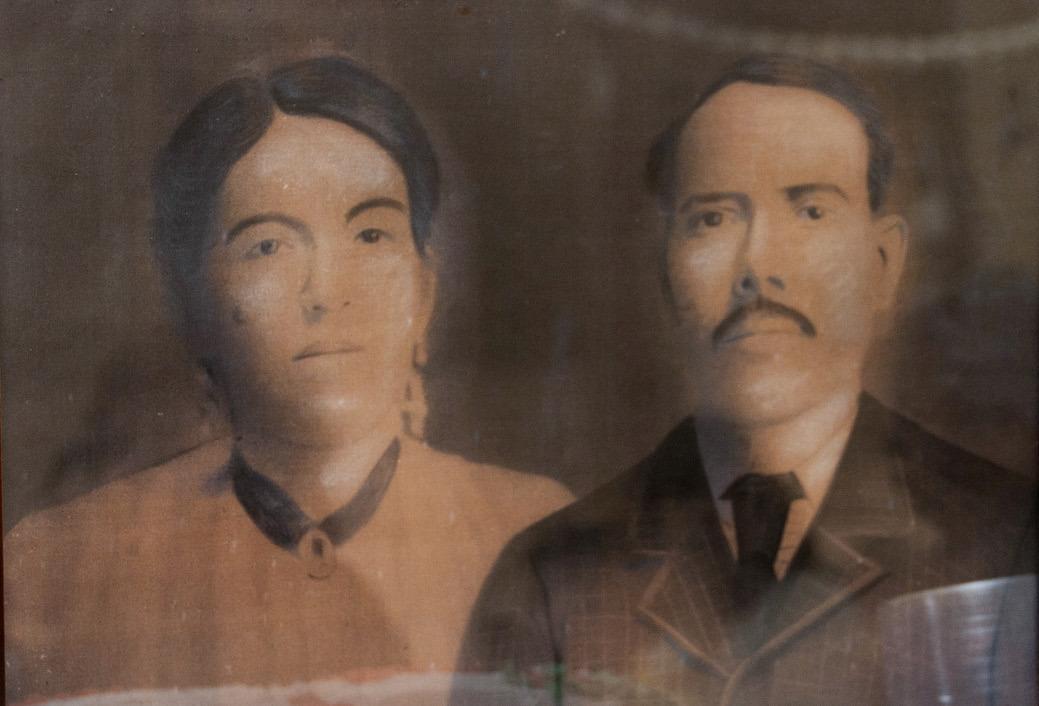
Bobbie Garza-Hernandez was recently inducted into the San Marcos Women's Hall of Fame for her volunteerism and leadership. These are qualities she shares with her family. Pictured is the Garza family when they donated to Centro Cultural Hispano de San Marcos Library.
Daily Record file photo

The Garza Family in 1948.
Photo provided by Bobbie Garza-Hernandez

Ignacio & Manuelita Garza (Garza-Hernandez' great grandparents and original owners of properties) passed down their properties to Marcos & Fidela Garza (Garza-Hernandez' grandparents) who were forced to move when their properties were seized by imminent domain in order to make Rio Vista Park.
Photo provided by Bobbie Garza-Hernandez
Lifting oppression by unearthing history
History is important; it teaches people who they are and where they come from and it gives examples of the impacts of certain behaviors–both positive and negative. A well-documented historical record can also provide people with access to knowledge that would otherwise be forgotten.
“Sometimes history is difficult to understand,” Bobbie Garza-Hernandez said. “There are things that happened in the past that … were painful at the time and continue to be painful for those that came after, but I really believe that there’s a lot to learn.”
Garza-Hernandez has worked tirelessly so that disenfranchised communities can embrace their cultural traditions and lineage. She has been working to advocate for minority groups whose history had been previously lost. She was recently inducted into the San Marcos Women’s Hall of Fame for her exemplary volunteerism and leadership qualities.
“My parents were very much involved in the civil rights movement here in San Marcos when I was growing up,” she said. “I saw the battles they fought. I saw the effort that they put into it.”
Garza-Hernandez has conducted research and found documents pertaining to San Marcos’ founding Hispanic families, who she said lost their homes, businesses and generational wealth to eminent domain. She has also worked extensively with the Indigenous Cultures Institute to ensure that Coahuiltecan people can learn the language, history and cultural practices of their heritage.
Garza-Hernandez was one of the founders of the Council for the Indigenous and Tejano Community and the group has been working on preserving and documenting oral history by finding supporting documents and speaking to ancestors of San Marcos’ Tejano founding families.
“The Council for the Indigenous and Tejano Community submitted an application to the Texas Historical Commission last year,” Garza-Hernandez said, noting that the council will receive one of 15 untold story markers. “In essence, what started out as documentation of the Garza family … turned out to be the story of 310 Mexican-American families that lived in the neighborhood that was totally eradicated in order to make room for Rio Vista Park.” She said there were also two Black and two white families, and most of the families were relocated to Sunset Acres, which is east of I-35 in town.
Garza-Hernandez said her great grandparents, Ignacio and Manuelita Garza, bought several properties in the community.
“In order to have additional properties for other Mexican-American families in the community,” she said. “Can you imagine what the value of those properties would be today?”
Garza-Hernandez relayed the Contreras family story–another of the displaced Hispanic families. She said the family had four brothers that attended Texas State University in the 1940s. One of them, Frank Contreras, became the director for the migrant program for the Texas Education Agency and was on the San Marcos City Council. She stressed that that was unheard of at that time.
Garza-Hernandez said that her work as Community Pilam for the Indigenous Cultures Institute has provided her with a much deeper understanding of her ancestry. She said that approximately 600 Coahuiltecan tribes occupied the majority of this part of Texas—groups that were also displaced, and as many know, were sent to reservations far from their native lands.
“The Indigenous Cultures Institute has really helped to bring another level of awareness to many of the families from this area that identify as Hispanic,” Garza-Hernandez said. “The majority of those that are Hispanic are also Indigenous. We were forced to hide our indigeneity because of the Europeans. When the Spaniards came here also, they took Native-Americans and colonized them. Changed their names to Spanish names, and made them all get baptized … They weren’t allowed to practice their Native- American religions or traditions or ceremonies.”
Garza-Hernandez said the colonization of Coahuiltecan people led to the loss of their language and cultural traditions. She, along with the other leaders at the Indigenous Cultures Institute, are working to rebuild that knowledge. She said it has been an extremely gratifying experience.
“We’ve begun to revive the Coahuiltecan language, which is considered extinct because less than a thousand people speak it,” Garza-Hernandez said. “Hopefully we will revive it enough so that more and more people will begin to understand it and utilize it.”
Reviving this Coahuiltecan ancestral knowledge has larger implications, as Garza-Hernandez said that Indigenous people have the medicine to cure the current state of the planet.
“When Indigenous people came onto this earth, they were given the gift by their ancestors,” she said, noting that it comes with the understanding that the earth and all its resources are spiritual. “Everything has been given to us on this Earth in order for us to survive, but we are the keepers of this Earth, and if we don’t take care of her then it will be our demise.”
She said that people must take care of the water and air so that it can sustain us, and that people need to stop spraying pesticides and cutting down thousands of acres of trees in order to maintain balance. She stressed that it’s important that humans respect the gifts that have been given, and that people accept responsibility for maintaining the resiliency of those resources for future generations.
Garza-Hernandez said the first site of the Indigenous Cultures Institute will be on land donated by Texas State University, and the first leg of funding has been provided by Hays County. It will be located adjacent to the Meadows Center for Water and the Environment, which is right next to Spring Lake–the location of the springs that gave rise to the Coahuiltecan people, according to the creation story.
For more information on the Indigenous Cultures Institute go to indigenouscultures. org.











